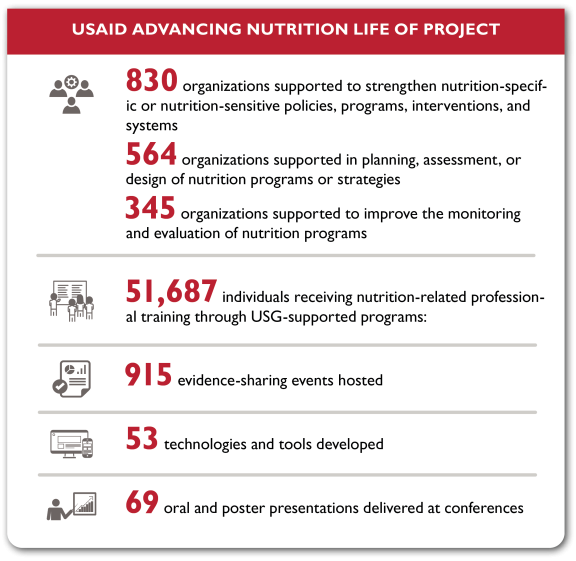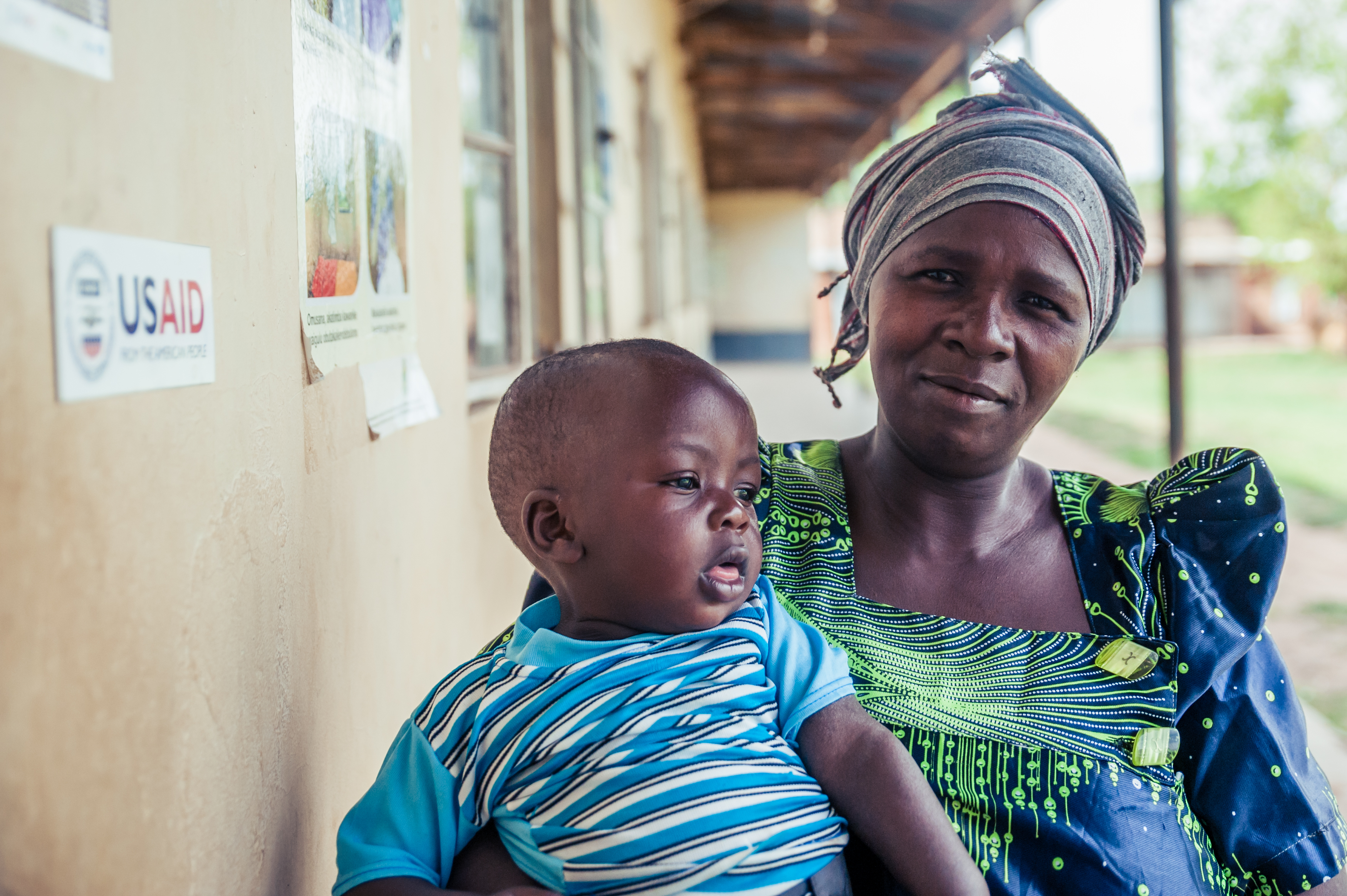USAID Advancing Nutrition was USAID’s flagship multi-sectoral nutrition project from 2018–2023. This is a summary of accomplishments and contributions across the life of the project.
Our team of technical experts worked to—
improve coordination and collaboration across sectors and disciplines to improve nutrition
build and translate research, learning, and experiences to programs and policies for improved implementation
strengthen the capacity of USAID Missions and partners in achieving sustainable, scalable outcomes for nutrition across humanitarian and development contexts
enhance the quality and measurement of nutrition programming.
A Legacy of Partnership, Learning, and Localization
The breadth of activities and products completed during the five-year life of the project reflect USAID’s efforts to adopt and promote a systems approach to multi-sectoral nutrition programming—within and across health and food systems. We strived to make our multi-sectoral nutrition knowledge, practice, and learning accessible.

Locally-led nutrition programming was at the heart of our technical approach, and we applied facilitative approaches to strengthen the capacity of governments, nongovernmental organizations (NGOs), and the private sector. In 12 countries and one region, we implemented high-quality programming and technical assistance.
We have highlighted key achievements, including links to related resources below, and invite you to download a summary of our report. For the full report, please visit the Development Experience Clearinghouse.
Key Advancements for Multi-Sectoral Nutrition
We contributed significantly to research, implementation, and learning in several areas of work that are critical to sustaining impact for nutrition, including—
USAID Advancing Nutrition collaborated with key partners at the global and country level to better integrate nurturing care components—including nutrition, responsive care, and early learning—into existing mother and child services to improve the quality of nutrition services within health systems and better tailor those services. This has included research, technical assistance, and implementation and resulted in the development of resources and built the evidence base. Work that advanced our understanding included efforts to integrate interventions supporting early childhood development into nutrition programming, improve the effectiveness of growth monitoring and promotion programs, explore how to institutionalize the Baby-Friendly Hospital Initiative, build provider competencies in breastfeeding competencies, and raise awareness of approaches and indicators beyond stunting to measure the impact of programming.
USAID Advancing Nutrition developed a set of tools, guidance, and interactive resources and curricula spanning the entire food system—from food supply, through the food environment, to food and water utilization—that helps USAID and partners apply a food systems approach when programming to promote healthy diets. We also worked closely with USAID to fine-tune, share, and train USAID staff and partners in the use of an evidence-based conceptual framework that helps to apply a food systems lens to program design and measurement over several years. Some of our most impactful activities have helped to assess the food environment, measure diet quality, and test measures of consumer demand for nutritious foods.
Recognizing how critical policy and governance is to sustaining multi-sectoral nutrition coordination, nutrition programs and outcomes, we supported nutrition governance-related work through 10 country programs at both national and sub-national levels. Our country-based work applied a range of approaches to enhance government commitment to nutrition based on country priorities. We provided technical assistance, supporting capacity strengthening to governments, and facilitating improved policy development and adoption; planning, budgeting, and financing; institutionalization; and data use for accountability. We also developed a number of resources for global use and adaptation including a Multi-Sectoral Nutrition Governance Resource Bank.
Social and behavior change (SBC) is a central element in USAID’s nutrition-related strategies and we designed USAID Advancing Nutrition with social and behavior change at its center. We recognize that sustainable change is possible only if key evidence-based practices are not only identified and shared with the full range of system stakeholders but are also supported for uptake and use through contextually-appropriate actions. A seminal output from our work was a suite of high-quality SBC tools to design, deliver, and measure nutrition-related behaviors and social norm change. However, an area where we made significant advancements is defining and testing SBC approaches in fragile and humanitarian contexts. Our work has informed improved guidance for complementary feeding practices in emergency settings and helped implementing partners of BHA-funded resilience and emergency programs to better plan, implement and learn from integrating nurturing care within infant and young child feeding programming with practical guidance on how to layer and sequence activities by the ages and stages of children under two years of age.
Throughout the five years, we used a facilitative approach that drew on local experts, organizations, and institutions to sustain results. At the same time, COVID-19 pandemic-related travel limitations increased opportunities for localization given the need to work remotely alongside in-country teams. Through multi-year partnerships, supported, in part, through USAID’s New Partnerships Initiative, we applied a range of approaches to strengthen the technical, operational, and functional capacities of local organizations and networks to improve nutrition outcomes. Several of our outputs point to our experience in strengthening the capacity of local partners to deliver and sustain high-quality multi-sectoral nutrition services and programs.
USAID Advancing Nutrition developed resources, guides, and tools to support quality nutrition program implementation. For example, we supported the Bureau for Humanitarian Assistance to better understand challenges to and improve programming of resource transfers for protecting nutrition in emergency contexts. In non-emergency contexts, we tested program design and implementation tools and guidance and provided on-demand technical assistance to Resilience and Food Security Activity partners. An example of our technical assistance included testing and evaluating the sustainability and suitability of strategies that promote local foods to replace U.S. government-provided resource assistance to address undernutrition in fragile settings. We contributed to better understanding the potential for using nutrition-sensitive agriculture interventions in emergencies and to advance social and behavior change sustainability and evaluation in fragile contexts. In the Democratic Republic of Congo, we supported acute malnutrition treatment and prevention programming by helping improve collaboration and accountability among a full range of government, nongovernmental, and multilateral stakeholders.
We had the opportunity to collaborate with USAID and a range of global experts to address key gaps in both evidence and practice related to addressing micronutrient malnutrition and, in particular, iron-deficiency anemia across both health and food systems. In addition to developing and testing guidance for improving large-scale food fortification at the national level, we facilitated the development of guidance for conducting context-specific assessments of the causes of anemia to inform the selection and design of appropriate interventions, and in collaboration with research partners, tested the validity and accuracy of hemoglobin measurement based on blood specimen type and HemoCue models. A key advancement came from our work with the Global Alliance for Improved Nutrition to revise the estimate of the global impact of micronutrient malnutrition and develop a transparent methodology to update the estimate in the future. We now understand that 1.4 million women of reproductive age and preschool aged children experience deficiency of at least one micronutrient.
USAID Advancing Nutrition strove to facilitate learning and sharing while also developing the evidence base across a range of topics. We brought key stakeholders together to not only share but also debate and learn from each other to strengthen evidence; inform better practice; and advocate for changes in policies, programs, and strategies. Convenings were organized and facilitated for USAID, such as ongoing support to the Global Nutrition Coordination Plan. We also planned and hosted convenings with external experts/stakeholders to inform new priorities for USAID such as improving food systems for complementary feeding, implementing growth monitoring and promotion, and supporting children with feeding difficulties and disabilities. We used a collaborative approach to our implementation research to understand the impact of the COVID-19 pandemic on nutrition programming globally. We also relied on and facilitated USAID’s use of expert consultations and cross-government collaborations to review, share and improve program evidence, design, implementation, and measurement.
